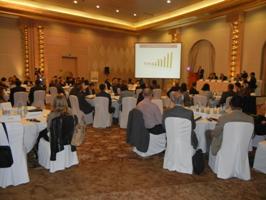Posted by Mark Silins
The Treasury Community of Practice (TCOP) of PEMPAL[1] conducted a highly interactive three-day workshop entitled “Public Sector Accounting Policies and Practices” from November 6–8, 2012. Treasury heads and specialists from 18 TCOP-member countries, as well as representatives of the Ministry of Finance of France, took part in the workshop held in Baku, Azerbaijan. The workshop was supported by experts from the World Bank, OECD, SECO and the Slovenian Centre of Excellence in Finance.
The general objective of the Baku event was to provide an opportunity for TCOP members to exchange experiences in implementing public sector accounting and reporting reforms. The event was designed to deepen participants’ understanding of the conceptual, institutional and operational challenges associated with the implementation of accounting reforms, particularly transition to the use of accruals and alignment with IPSAS. The event involved some very informative presentations by officials from participating countries on good practice and practical tips and traps associated with this area of reform, supplemented by input from a small number of international experts. This approach provided a useful basis for a range of dynamic group discussions by TCOP-member countries. As the host country, Azerbaijan also provided detailed information on its broader economic and PFM reforms to date, along with its plans for the future.
 The following is a brief summary of the main findings of the workshop.
The following is a brief summary of the main findings of the workshop.
- Countries are most likely to benefit from adapting IPSAS rather than adopting them, ensuring specific national requirements are accommodated without losing the benefits of more modern international accounting practices;
- Accounting and reporting reform will be a significant undertaking – it requires careful planning and an incremental approach to reform;
- Budget, financial and statistical reporting have largely converged – accommodating the differences should be possible through a well-designed single CoA. This is however, a continuing challenge for many countries which should be addressed;
- If countries wish to be internationally competitive, they must implement internationally comparable methods of private and public sector accounting. There is a strong case for adoption of national standards which are in line with IPSAS as it provides a framework for accounting practices and also for the production of internationally accepted financial statements;
- Accounting and reporting reforms must first focus on the benefits to a country rather than externally driven agendas. Country ownership and political support are key if reforms are to be successful;
- Accounting reform is part of a broader reform agenda for improvement in the performance of the public sector. Managers need to go beyond just understanding to applying the information to ensure the best use of financial information; and
- For transition economics, accounting reform is a paradigm shift from centrally-driven compliance to devolved decision making and accountability. This requires officials with vastly different skills in the future.
Three new initiatives were discussed as possible areas for further work by TCOP member countries:
- Development of a PEMPAL response to the current IPSAS draft paper ” IPSASs and Government Finance Statistics Reporting Guidelines”, through which PEMPAL would make a case for improved convergence of the two reporting frameworks to better support developing country requirements;
- Development of a thematic group for consideration of issues for countries who are seeking, or required, to meet ESA 95;
- Development of a concept paper on the design of a single CoA to support budget, financial and statistical reporting.
A more detailed report on the event is available. Presentations from the event can also be reviewed.
The next PEMPAL workshop is scheduled for April 2013 in Kiev, Ukraine, for which the theme will be “Internal Control and the Role of the Treasury”.
[1]Public Expenditure Management Peer Assisted Learning (PEMPAL) aims to improve the efficiency, effectiveness and transparency of public expenditure in Central and Eastern Europe and Central Asia countries. The program supports activities that bring practitioners in public finance together in COPs to enhance peer learning through benchmarking performance for implementation of reforms in public finance. For more information on PEMPAL please go to www.pempal.com.
Note: The posts on the IMF PFM Blog should not be reported as representing the views of the IMF. The views expressed are those of the authors and do not necessarily represent those of the IMF or IMF policy.







